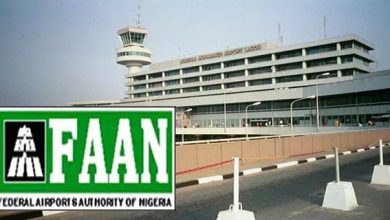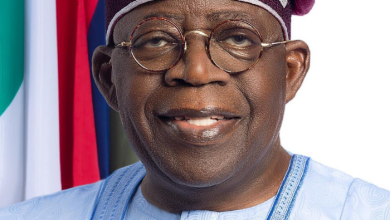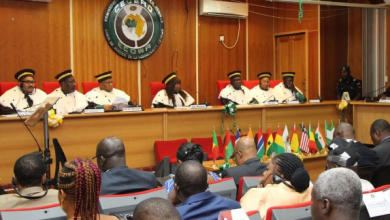Tinubu reaffirms resolve to defeat terrorism, strengthen global alliances

Tinubu reaffirms resolve to defeatPresident Bola Tinubu has reiterated his administration’s unwavering commitment to combating terrorism and strengthening Nigeria’s global partnerships, declaring that the government remains focused on steering the nation toward stability and prosperity under the Renewed Hope Agenda.
Speaking after a detailed economic presentation by the Minister of Finance and Coordinating Minister of the Economy, Mr. Wale Edun, during Thursday’s Federal Executive Council (FEC) meeting, President Tinubu emphasised that despite mounting political and security pressures, his government would not relent in its efforts to secure the country and improve the economy.
“The task before us is enormous,” Tinubu stated. “But we are united in our determination to defeat terrorism and build a prosperous, inclusive, and resilient Nigeria, ” he said.
Tinubu’s remarks came amid global attention following recent comments by U.S. President Donald Trump, who threatened to deploy American forces to Nigeria if the government failed to curb attacks against Christians allegedly perpetrated by Islamist extremists.
In a post on his Truth Social account, Trump warned that the U.S. would “immediately halt all aid and assistance to Nigeria” and was prepared to go “guns-a-blazing” to eliminate terrorist networks if the Nigerian authorities did not act swiftly.
He added that the Department of War had been directed to prepare “fast, vicious, and sweet” military options.
Reports later emerged that the U.S. Africa Command had submitted contingency plans for potential airstrikes in Nigeria, following an order from Trump instructing the Pentagon to draw up operational strategies to protect Christians in the region.
According to The New York Times, these proposals—labelled “heavy,” “medium,” and “light”—outline varying levels of possible U.S. military involvement within Nigerian territory.
Turning to economic matters, President Tinubu highlighted the country’s recent Eurobond oversubscription as evidence of strong international confidence in Nigeria’s economic fundamentals.
“Despite political anxieties, investors continue to show faith in our reform direction,” the President said.
Presenting his report to the Council, Minister Wale Edun disclosed that Nigeria’s Gross Domestic Product (GDP) expanded by 4.23 percent in the second quarter of 2025, marking the country’s strongest growth outside the post-pandemic rebound.
He added that 13 sectors recorded growth above seven per cent, while the industrial sector nearly doubled its performance—from 3.72 per cent to 7.45 per cent signalling renewed investor activity and rising productivity.
Edun reported that inflation fell to 18 per cent by the end of last year, while foreign reserves climbed beyond $43 billion.
The trade surplus, he noted, reached N7.4 trillion, reflecting stronger external buffers and improved fiscal health.
He added that new consumer data showed Nigerians now spend roughly half their income on essential goods, compared with nearly 90 per cent previously, an indication, he said, of a gradual shift from subsistence living to higher productivity and better living standards.
The minister described Nigeria’s removal from the Financial Action Task Force (FATF) grey list as a major boost for investor confidence.
He pointed out that global institutions such as the IMF and World Bank had upgraded Nigeria’s growth forecasts and credit outlooks in response to the country’s ongoing economic reforms.
He also announced that Nigeria’s €2.35 billion Eurobond issuance attracted over $13 billion in investor bids, underscoring, in his words, “the world’s reaffirmed trust in the Tinubu administration’s economic direction.”
Edun said the government’s medium-term goal is to achieve 7 percent annual growth by 2027 and expand the economy to $1 trillion by 2030.
To reach this target, he urged greater mobilisation of both domestic and foreign investment and the removal of regulatory bottlenecks across key sectors such as infrastructure, mining, health, education, agriculture, and the blue economy.
He also announced that ministries would collaborate with state governments to identify and promote “investment-ready projects” capable of attracting large-scale private capital.
During the meeting, Secretary to the Government of the Federation, Senator George Akume, formally announced the deaths of two prominent Nigerians — former Minister and Senator Solomon Ewuga, and former Chief of Staff and ex-military governor General Mohammed Abdullahi.
Ewuga, who served as Deputy Governor of Nasarawa State in 1999 and later as Minister of State for the Federal Capital Territory, died on September 23 in Egypt at the age of 70.
General Abdullahi, who once led the Nigerian Security Organisation (NSO) and served under President Olusegun Obasanjo, was also remembered for his years of service.
Council members observed a minute’s silence in their honour.
Despite domestic challenges and external political tension, President Tinubu’s message to Nigerians and the international community remained consistent: that his government is determined to secure the nation, drive economic reform, and uphold Nigeria’s sovereignty in the face of growing global scrutiny.



